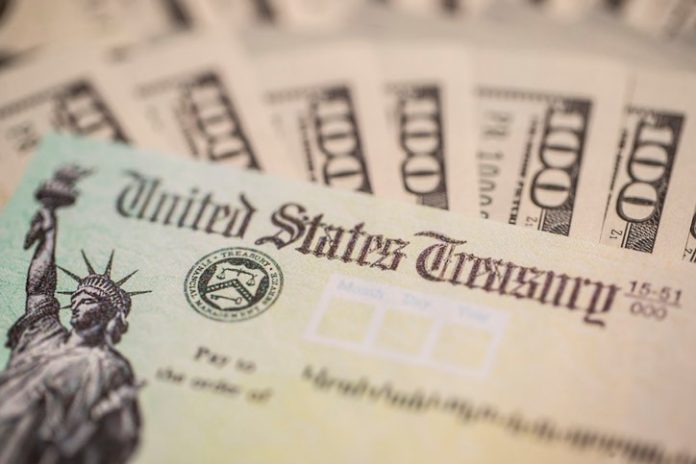The House of Representatives plans to vote Friday on President Joe Biden’s $1.9 trillion COVID-19 relief bill, which includes $1,400 stimulus checks for most Americans.
On Monday, the budget committee held the first major vote for the 591-page package, as Democrats continue to debate issues such as raising the minimum wage and how much aid to funnel to struggling state and local governments; the measure passed the panel on a largely party-line vote of 19-16.
As of now, Americans who received a check in the last round of direct payments would get one with this potential third round. While that could change as the measure makes its way to the full House and then over to the Senate, the current plan keeps income thresholds at the same mark for those $600 payments.
If you need a refresher, anyone who made $75,000 or less will get the full amount — and couples earning $150,000 or less will get $2,800 in relief payments. As your income level increases above those thresholds, the amount you will receive decreases. The current plan calls for a phase out of direct payments for single people earning $100,000 and couples earning $200,000.
Republican leaders and even some Democratic lawmakers have called for and proposed lower thresholds to ensure the direct payments are targeted to Americans who need them the most. However, President Joe Biden has pushed back at that.
“Now’s the time we should be spending. Now is the time to go big,” Biden said during a CNN event last week.
In addition to those $1,400 payments, the $1.9 trillion relief proposal includes an increase to child tax credits and offers an extra $400 weekly federal unemployment benefits through August. It would provide hundreds of billions of dollars for state and local governments, shuttered schools, COVID-19 vaccines and testing, and struggling airlines and other businesses.
Though Democrats have the majority needed to get the deal pushed through, it hasn’t been an easy process.
Democrats’ thin 10-vote House majority leaves little room for defections in the face of solid Republican opposition, and they have none in a 50-50 Senate they control only with Vice President Kamala Harris’ tiebreaking vote. Internal Democratic disputes remain over raising the minimum wage, how much aid to funnel to struggling state and local governments and whether to extend emergency unemployment benefits another month.
But at this point, Democrats across the party’s spectrum show little indication they’re willing to embarrass Biden with a high-profile defeat a month into his presidency.
Such a setback would deal early blows to Biden, new Senate Majority Leader Chuck Schumer, and House Speaker Nancy Pelosi in what could be her last term as speaker. It could also wound congressional Democrats overall by risking repercussions in the 2022 elections if they fail to unite effectively against clear enemies like the pandemic and the frozen economy.
“You think very seriously before casting a deciding vote against your own party’s president’s legislative agenda,” said Ian Russell, a Democratic consultant. But he cautioned that lawmakers must decide “for themselves how their vote is going to play out” at home.
The issue that’s provoked the deepest divisions is a progressive-led drive to boost the federal minimum wage to $15 hourly over five years. The current $7.25 minimum took effect in 2009.
“It was the No. 1 priority for progressives,” Rep. Pramila Jayapal, D-Wash., chair of the Congressional Progressive Caucus, said in an interview last week. “This is something we’ve run on and something we’ve promised to the American people.”
An overall relief bill, including the minimum wage boost, is expected to clear the House, and likely the Senate as well. But the minimum wage boost’s fate is shaky in the Senate, where Joe Manchin of West Virginia, perhaps the chamber’s most conservative Democrat, has said $15 is too expensive. Sen. Kyrsten Sinema, D-Ariz., has suggested she might oppose it, too.
More ominously, the Senate parliamentarian is expected to rule soon on whether the minimum wage provision must be tossed from the bill. Under expedited procedures Democrats are using, items that aren’t principally budget-related can’t be included, and it’s unclear if Democrats would have the votes to overturn such a decision.
Yet with every Democrat having leverage because virtually all votes are needed, there have been no overt threats to take the entire bill down unless they get their way.
Senate Budget Committee Chair Bernie Sanders, I-Vt., his chamber’s chief minimum wage sponsor, said Democrats must “act boldly” and approve a package with the minimum wage increase. He answered indirectly when asked if he’d be willing to compromise to keep the plan in the overall bill.
“Every Democrat understands that at this moment in history, this unprecedented moment of pain and suffering for working families, it is absolutely imperative we support the president, that we do what the American people want and we pass that package,” he said in an interview.
Rep. Brad Schneider, D-Ill., a leading House moderate, also signaled distaste for intractable demands. The pathway to success is to “push as hard as you can to get as much as you can now that you want, not compromise your principles and know that tomorrow’s another day,” he said.
Republicans said the measure’s higher minimum wage and increased unemployment benefits would cost jobs or discourage people from seeking work, and said much of the spending was wasteful.
“This is the wrong plan for America’s working class,” said Rep. Jason Smith, R-Mo., the budget panel’s top Republican. Across the Capitol, Senate Minority Leader Mitch McConnell, R-Ky., said Democrats were pushing “Band-Aid policies like they’re planning for another year of stagnation, instead of trying to set up success.”








